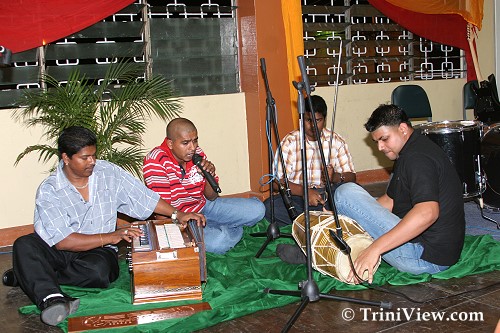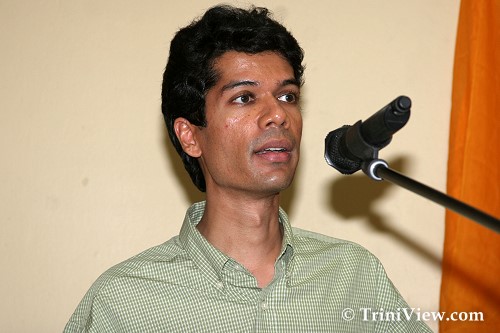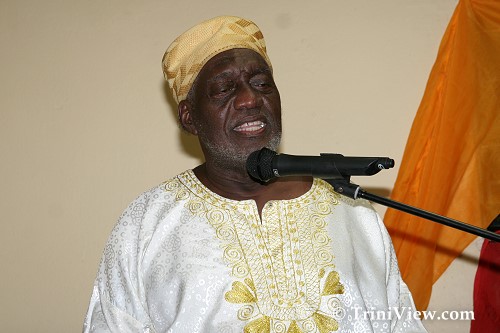 Bro Doodnath and accompanying musicians
Bro Doodnath and accompanying musicians
TriniView.com Reporters
Event Date: June 03, 2007
Posted: June 12, 2007
The National Joint Action Committee (NJAC) held its annual Indian Arrival Day commemorative observation at the Butler Institute of Learning on Duke Street, Port of Spain. The welcome area displayed pictures and objects reflective of the East Indian heritage including a dholak, harmonium, dhantal, deyas, pictures and Indian wear.
Ravi Ji of the Hindu Pretchar Kendra; Noble Khan of the Inter-Religious Organsiation (IRO); Spiritual Baptist Archbishop, Barbara Gray Burke; and NJAC President Aiyegoro Ome opened the event with their respective prayers.
Indarraj Mahabir and the Rising Star Tassa Group who have been together for about twenty-five years treated the audience to the pulsating sounds of Tassa drumming.
Following this, Calypsonian Michael John, also known in the Calypso world as 'Mr. Nature' sang "Divide and Rule", which explored relations between Africans and Indians in Trinidad. This scored well with the audience, earning him an encore.
Embau Moheni, head of the Tobago Cultural Committee brought greetings from Tobago and reflected on the importance of sharing different experiences in the process of building a nation.
 UWI History Lecturer Jerome Teelucksingh
UWI History Lecturer Jerome Teelucksingh
Dr. Jerome Teelucksingh, a Lecturer of History at the University of the West Indies delivered an address titled "East Indian Presence in Trinidad and Tobago 1845-2007: A Bird's Eye View", lauding NJAC for being the first group to celebrate Indian Arrival Day. Dr. Teelucksingh painted a vivid picture of the arrival of East Indians in Trinidad on the 30th May, 1845, describing the clothes they were wearing, the jahajee bundles they carried, the different languages they spoke, the villages they came from and the villages that they were settled in. Describing the conditions experienced, he said that they were scorned and beaten by planters and, as a consequence, some ran away from the plantation and were jailed for vagrancy and absenteeism. In addition, he advanced that East Indians were scorned by the Africans, not only because the Indians worked for lower wages but because of their clothing, their different languages, different religions and different dietary preferences. According to Dr. Teelucksingh, it was here that the seeds of racism were planted. He said that the colonial authorities ignored divisions as they wanted to keep East Indians and Africans apart. He further emphasized the alienation of East Indians in the Indentureship period, but said everything that made the East Indian community alien also gave it great strength.
He further highlighted the activities of White missionaries who built schools, but who were very contemptuous of Hinduism and Islam, calling it pagan and inferior. He said that these activities allowed East Indians to learn English and to become educated, but it came at a price because many lost their religion and cultural identity. He said that East Indians have become rational, logical, independent thinkers who have made progress in business, education, medicine and science.
Nyahuma Obika, President of the Caribbean Historical Society sought to put the Indian Arrival Day in context by speaking about the early Independence struggles of India. He remarked that by a series of brutal wars from 1757-1857, Britain succeeded in imposing its will on the subcontinent of India. He spoke of the disrupting impact of this for indigenous industries and for the village, adding that the spread of the West meant a determined attempt at the conversion of 206 million people into Christianity. He said that in 1857, people rose against British rule in what was the First War of Indian Independence. He described the war in great detail mentioning the resistance of the legendary Rani Jhansi and said that the upsurge in Indian immigration after the war was very significant.
 Makandal Daaga, Chief Servant of NJAC
Makandal Daaga, Chief Servant of NJAC
Makandal Daaga, Chief Servant of NJAC addressed the gathering and disagreed with Dr. Teelucksingh's interpretation of race relations in Trinidad and Tobago. Using contemporary examples of the attitudes of striking workers to incoming scab labour as an analogy, he explained that attitudes of Africans towards Indians at the start of Indentureship was not best viewed according to race, but according to the labour situation at that point in time. He gave his opinion that the first semblance of negative race relations in this country occurred with the loss of the PNM in the federal elections. Makandal Daaga went on to share many of his experiences during and after the 1970 Black Power Revolt, reinforcing his point that negative relations between Africans and Indians were exaggerated. He implored the audience to resist the hostility being developed by the establishment and the media. He stated that the media has never written on the brutality that was meted out to East Indian youth by police and soldiers in Central for participating in the Black Power Marches in the 1970's.
Liseli Daaga, head of the Butler Institute of Learning, and Alpha Obika of the National Youth Action Committee (NYAC) also addressed the audience.
The evening was spiced up by Bro. Doodnath and his traditional Indian songs; singer Mukesh Barooram, who delivered a moving Pachakaree song "Its Time to Heal"; Jagdeo Phagoo with his song "One Nation, One People"; and Calypsonian Jervae Caesar.
The ceremony ended on a good note with the audience gaining enough food for thought for further discussions in the future.
NJAC's Indian Arrival Day Observation 2007 in pictures:
www.triniview.com/gallery/main.php?g2_itemId=183823
Homepage | NJAC | Photo Gallery
|
